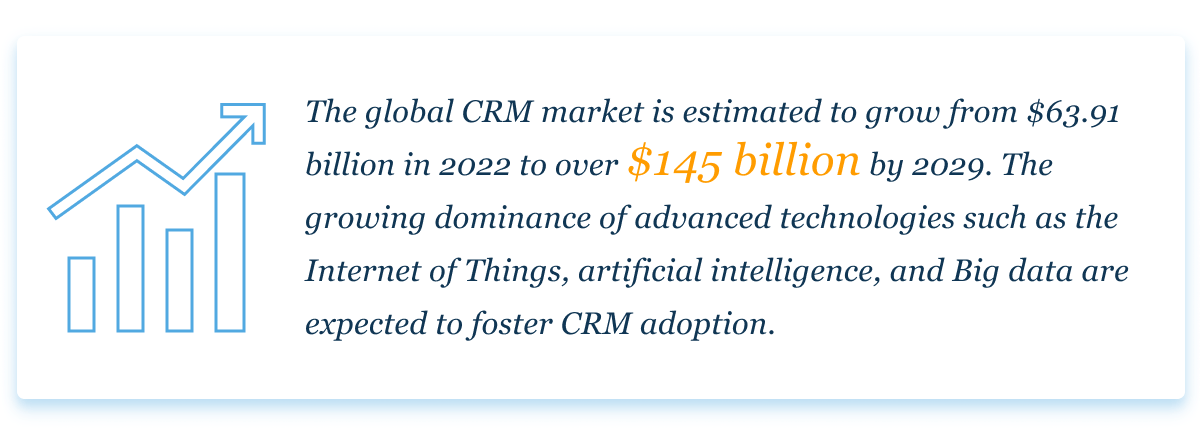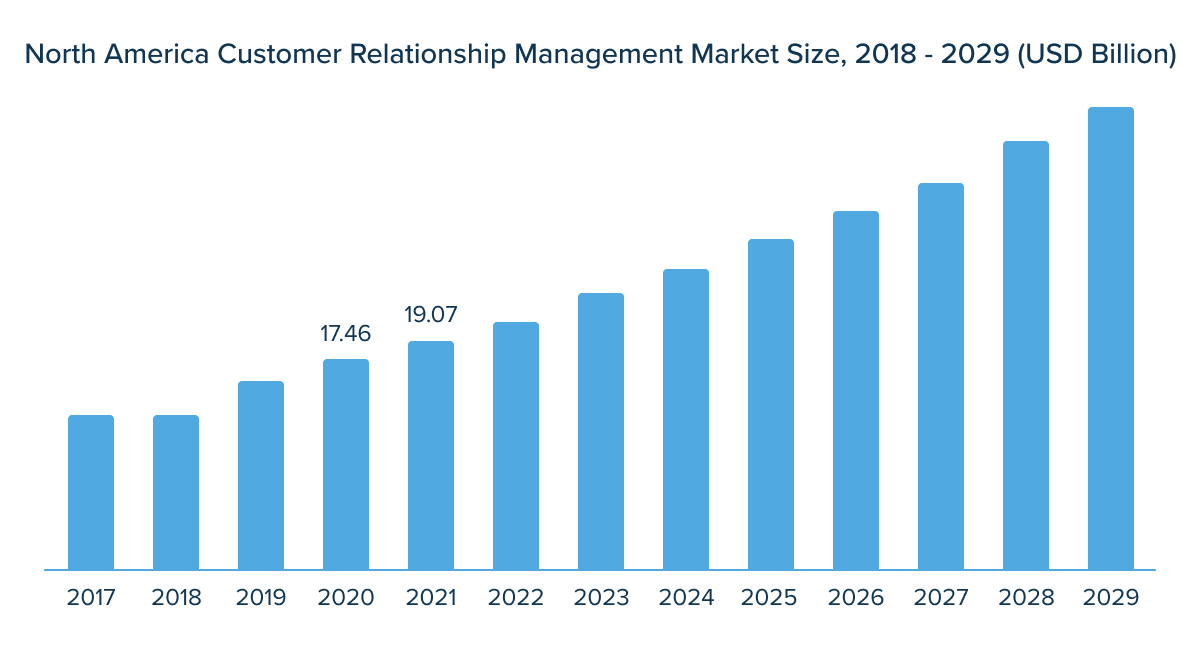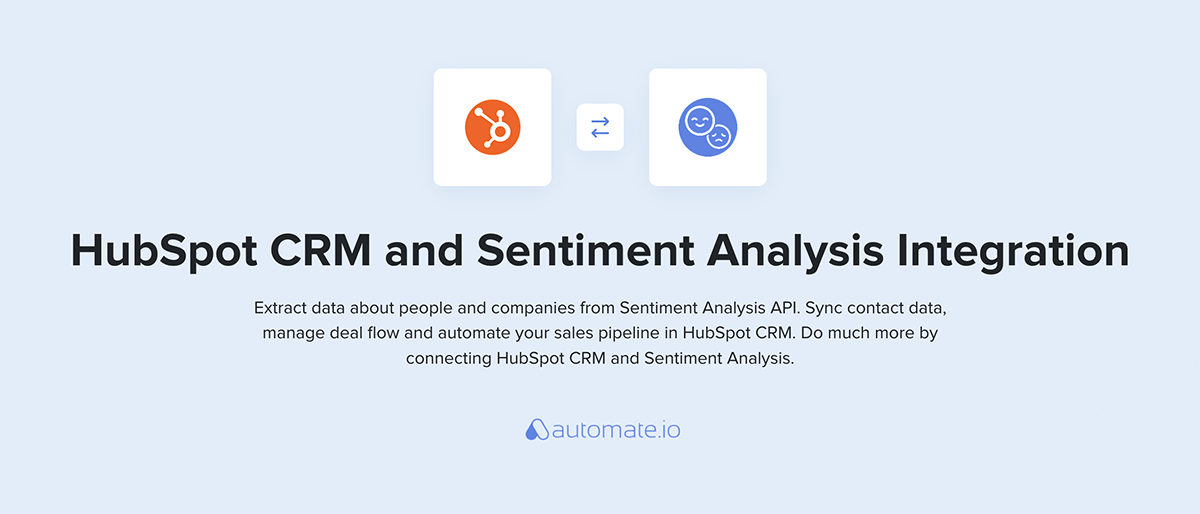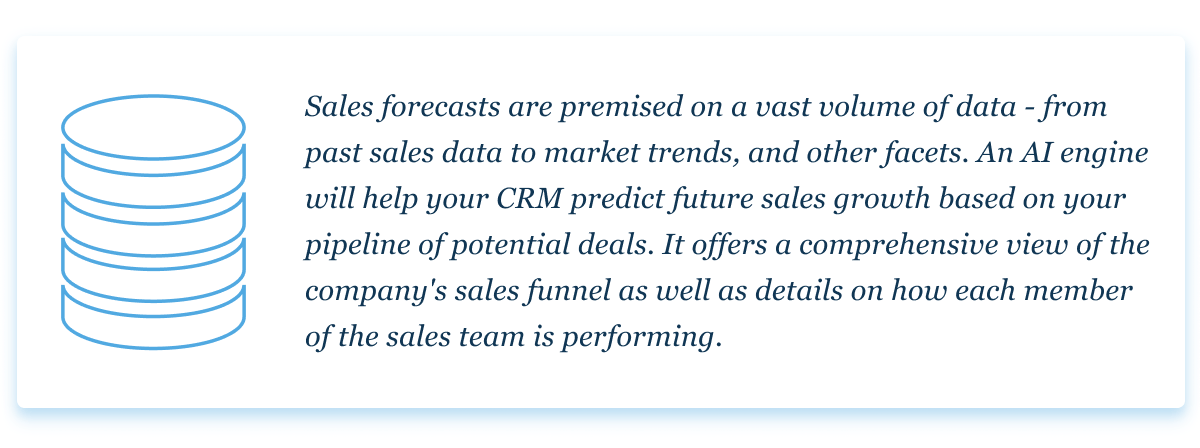There’s a lot that makes a good salesperson. In 2022, persistence, self-confidence, self-development, and other virtues are joined by another salient component – AI in CRM. Customer relationship management systems have become the go-to tool for modern companies as the customer journey is now mainly digital.
Today, we’ll go over the potential of artificial intelligence in customer relationship management as well as AI CRM use cases.
What is customer relationship management?
The customer is the top and center of any B2B business. And CRM software is a type of business management software that is used to manage customer relationships. In today’s competitive market, businesses need to be able to keep track of their customers and prospects in order to stay competitive and grow their business.

A CRM system collects data on each individual customer’s past history with the company, including purchase history, demographics, and behavioral data. This data can then be analyzed to identify trends and patterns in the customer base that can be used by sales personnel to tailor their products or services toward specific groups of customers.

Source: Unsplash
CRM software is often integrated into back office operations such as accounting and human resources. As such, it can be used for purposes other than simply tracking customers’ interactions with the company.
It’s an indispensable tool to manage marketing campaigns and sales processes, service delivery, and even internal communications between departments within a company.
Customer relationship management in 2022

From a tech standpoint, customer systems can be divided into on-premise, cloud, and hybrid. According to research, cloud systems top the ladder among other kinds of CRMs.
Geographically, North America leads the way and surpasses other locations by adoption. According to Fortune Business Insights, the North American market is ripe for skyrocketing growth.

Artificial intelligence and CRM: main benefits
As customers have migrated online, customer data has long left notebooks and paper. The digital era has also invited a new inundation of customer data that is now taken care of by CRMs. An AI CRM system is the new development stage of customer experience that helps businesses boost conversions and drastically improve users’ journeys. Now let’s have a closer look at the benefits of AI for CRM.
Effective data processing
As the omnichannel strategy becomes the de facto standard for customer-facing businesses, data needs have become unprecedented. The amount of unstructured and multi-format information makes it difficult to process the data in a traditional way. With this task in mind, global businesses turn to AI consulting so that their CRM platform can tackle a growing body of data.

Source: Unsplash
AI CRM software, on the contrary, excels at real-time activity and feedback data analysis. Lead sources, customer lifetime value data, win rates and other insights are injected and analyzed within one platform.
Enhanced customer satisfaction
Artificial intelligence in customer relationship management helps a company track the entire user journey and sculpt a complete customer persona. If we add automated segmentation, lead scoring, and historical analysis allows you to stay connected to customers and deliver personalized offerings.
The predictive power of algorithms also helps anticipate future client needs. The system can automatically monitor the client’s status and trigger events if the client needs human assistance.
Automation
Smart platforms can lend a helping hand to sales reps that usually have a lot on their plates. Past interaction analysis, account management, call scheduling, document management and automation, lead engagement, and others guzzle up loads of sales time. Machine intelligence simplifies mundane tasks by taking over critical activities and assisting the sales rep at every stage of the sales cycle.
Better performance
Finally, AI-enabled CRM bodes well for the overall business performance thanks to an integrated data viewpoint. Any department can access readily available insights, be it transactions or customer queries. Intelligent report generation lays bare bottlenecks in performance and identifies areas for improvement based on accurate forecasts and historical analysis.

Source: Unsplash
AI CRM: top use cases
There is no doubt that artificial intelligence is revolutionizing the customer relationship management industry. By automating various tasks and processes, AI for CRM is making it possible for businesses to provide a better customer experience while also reducing operational costs. Below, we will explore some of the top AI CRM use cases for AI in CRM systems.
Marketing
Although CRMs are often considered a purely sales tool, they are also a go-to information base for marketers. Below, we’ve shared the top smart applications of customer platforms for marketing teams.

Source: Unsplash
Customer segmentation
Although high-converting segmentation depends on a specific relationship management platform, CRM artificial intelligence is much more likely to drill down into your clients’ data. With a unified source of information, AI CRM systems help you divide your client base into different categories. Demographics, purchase history, engagement channels, and others are automatically analyzed by algorithms to assign the targeted segment to the user.
Any qualitative comment turns into quantitative data with AI development solutions. This way, any bit of knowledge, be it a call center call or email, adds to the overall client image.
Smart software can also generate predictive segments based on forecasted behavior.
Sentiment analysis
Emotion or sentiment analysis refers to the combination of NLP, text analytics, and voice recognition that help determine the attitude of a client towards a brand, service, or product. Emotion analysis can even step in during a customer call to evaluate a client’s emotions, generate better responses or assess the effectiveness of a call.
The output from sentiment analysis can then be integrated into your CRM to segment customers by emotion or stimulus.

Thus, a popular canned CRM, Zoho, allows business owners to scan the content of every email. The algorithms group the content into positive, negative, or neutral. Customer support tickets can also be assigned a tone to help support agents promptly act on negative customer feedback.
Recommendation systems
AI-enabled CRM is no longer a system of record, but a fully operating predictive machine that turns your data into actionable guidelines. The advanced platform combines data from first, second, and third parties to create a bird’s-eye view of your target audience. Machine learning capabilities, in turn, facilitate a system of recommendation that helps sales close deals faster.

Content creation
Using a synergy of relationship platforms and natural language processing, marketing teams can also accelerate content production. Thus, CRM artificial intelligence tools can automatically generate granular emails, reviews, and client reports.
Automated email sequencing also helps both marketers and sales scale their outreach efforts. Sequences can also be set up to trigger when a lead arrives at a certain pipeline stage, which further alleviates prospect tracking.
Sales
Undoubtedly, sales are the ultimate goal of client platforms, which makes AI CRM the dominion of sales departments. Below, you’ll find the main applications of AI-powered CRM platforms for sales teams.

Source: Unsplash
Lead qualification
Reeling in more deals is the upshot of lead qualification done right. As a process, lead qualifying is the process of determining the prospect’s interest and intent, so that you can decide whether to pursue them or not.

Algorithms can easily scan through a database of leads and identify those that have the most potential. They can also sort out potential leads that have already been contacted by other companies and identify those who are not interested in a product or service.
From a tech perspective, automated qualification can either be made through predictive data analysis or conversational AI that is used to understand leads’ needs.
Churn prediction
Churn reasons have a world of differences based on behaviors, preferences, and needs. Therefore, contextualizing client behavior in each of the lifecycle stages can prevent your prospects from slipping through the cracks and nurture more loyal clients.
Your sales have to calculate the customer lifetime value (CLTV) for each client to predict which customers will churn. With machine learning, this task is handed over to a predictive behavior modeling system and dynamic micro-segmentation.

Source: Unsplash
Miscellaneous
Beyond sales and marketing, companies also adopt intelligent client systems to streamline tedious and effort-intensive tasks. You will find some examples of how AI in CRM helps tackle the everyday drill of client-facing companies.
Document management
According to Forbes, sales spend less than 36% of their time actually selling something. The rest of their work time is frittered away on manual and time-consuming tasks such as document management.
Today, all-in-one smart relationship platforms also come with an integrated document processing capability. They provide a centralized repository for sales collaterals, data sheets, and other relevant documents. Here, sales can attach collaterals to the associated deal and assign user-based access to the document.
Machine learning levels up this feature by streamlining information insertion. Algorithms populate the required information from a CRM system automatically into the designated fields in your document. Expert platforms also eliminate the manual effort needed for transforming paper documents into digital media. Built-in optical character recognition automatically converts handwritten or printed text into computer-encoded text.
Data cleaning
According to Dan&Bradstreet, customer relationships platforms are plagued by bad and incomplete data. Thus, 91% of data in a CRM is incomplete, while 18% of client data is duplicate.
AI-based CRM automates the process of data entry, thus standardizing input and weeding out irrelevant pieces. Moreover, Machine Learning crafts accurate data models faster than brainstorming manually. Models help enterprises set up an automated data cleaning process.
Sales forecasting
Sales forecasting is one of the strategic instruments that gives a heads-up to business owners. Companies use sales forecasts to make decisions about inventory, product development, marketing, and other aspects of their business.

Virtual assistants
When businesses scale, executives need their sales team to yield maximum performance. Handing over daily CRM functions to a smart assistant is what helps companies grow without sacrificing quality.
The responsibility areas of CRM virtual assistants can be divided into two groups:
- Daily tasks: Intelligent assistants can take over mundane in-office tasks like call scheduling, purchase processing, and others.
- Smart call routing: Driven by natural language processing, the system can automatically segment customer queries and forward complex queries to a human agent.
Data entry
Data entry is a crucial but often mundane task in many businesses. Manual entry is prone to human errors and a slow turnaround time. AI and CRM can help with data entry by providing a more accurate and efficient way to input data. This can save businesses time and money, and prevent errors that can lead to costly mistakes.
Intelligent data entry inserts customer data in the required format and automatically reads the input from calls, emails, visuals, and other formats. Image and speech recognition as well as optical character recognition allow for error-free entry into the customer platform.
AI in CRM systems: the future is now
It’s an axiom that the customer is the heart of every business. But no matter how huge your client base is, it won’t yield profit and conversions unless you know your way around your customer. CRM and AI brings your client awareness to the next, intelligent level. Effective data processing, automated daily tasks, and accurate predictions allow your sales team to stay in sync with every client and boost the performance.
Empower your marketing team with AI
Schedule an intro call with our consultants to explore your business and find out how we can help.



